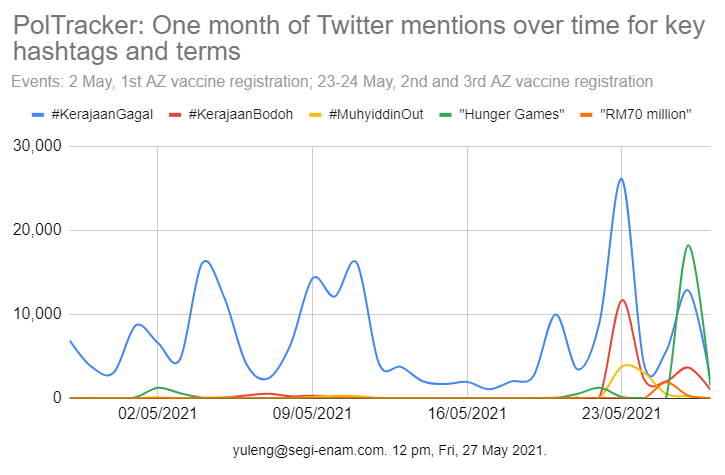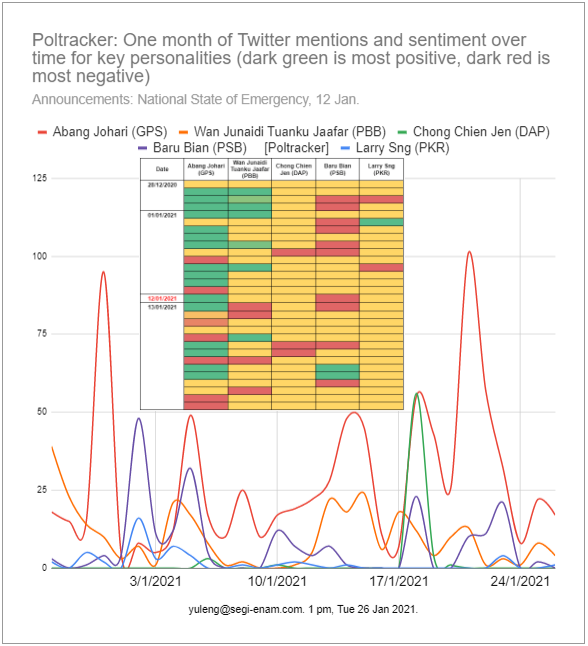Covid-19 pandemic and the declaration of Emergency on 12 January have cooled off talks of a snap poll at the national level but not quite in the case of Sarawak.
On 22 January, it was reported that the Sarawak government plans to appeal to the Yang di-Pertuan Agong to lift the emergency order in the state if it can bring the Covid-19 situation to a manageable level. This would then pave way for the state election.
The present state government has a mandate until June while the Emergency order is expected to be in force until 1 August. An election must be held within 60 days of the expiration of the mandate or dissolution of the state assembly. The Emergency (Essential Powers) Ordinance 2021 among others stipulated that general elections, state elections and by-elections, as well as Parliament and State Legislative Assembly sittings, will not be held as long as the emergency is in force.
Sarawak has had good control of the spread of the pandemic with tight border controls and mandatory quarantine of 14 days upon arrival, thereby keeping its cases low. However, in the past month, there has been a surge in cases which have since spread to the longhouses and interior part of the state. Presently at daily three-digit high, it would take some weeks to bring down the numbers again.
A total of 82 state seats are up for grabs at the 12th state election. Gabungan Party Sarawak (GPS) has control of the state with 68 seats. GPS was created post 2018 general election where the Sarawak-based parties withdrew from Barisan Nasional (BN) but remained friendly to them. The opposition bloc has the remaining 14 seats.
GPS, led by Chief Minister Datuk Patinggi Abang Johari Openg who took over the state leadership after the demise of the late Tan Sri Adenan Satem in 2017, has been dishing out aids to the people and businesses since the onset of the pandemic.
To date, its Bantuan Khas Sarawakku Sayang (BKSS) has spent almost RM3 billion to mitigate the impact of Covid-19. The relief from BKSS has been well received and will to a certain extent help to shore up support for GPS which will bode well for the coming election.
The pandemic has also resulted in the state tightening its entry rules. In October last year, the state announced that all election workers and campaigners from outside Sarawak must obtain a work permit from the state Immigration Department before they are allowed entry in the event of a state election. This, to a certain extent, would put a spanner in the opposition machinery.
The opposition front especially Democratic Action Party (DAP) had in past elections relied on many out of state campaign workers which include polling and counting agents. The outsiders were known to be more vocal and assertive when dealing with issues especially at the polling and counting centres as compared to local election workers, a fact that did not escape Deputy Chief Minister Datuk Amar Douglas Uggah.
Uggah warned Sarawakians that campaign workers from the peninsula are known for their more aggressive or robust behaviour.
“Let us not be cowed by them nor should we imitate them,” he said when announced the work permit requirement.
While there is a movement to take Sarawak out from Malaysia, it is not expected to make any headway for now. Bread and butter for the ordinary man on the street and development of better infrastructure for rural areas remain the issues at hand.
While the opposition had a good chance of giving GPS a run for its money, had the election been called when Pakatan Harapan (PH) was in power at the Federal level, it would be another uphill battle to wrestle the state.
The opposition has yet to work out the seat allocation between them to avoid contesting against each other. Parti Keadilan Rakyat (PKR) Sarawak has issued an ultimatum to Parti Sarawak Bersatu (PSB) that a deal must be reached by the end of the month. PKR had lost some seats when some assemblymen left the party when the PH government collapsed and has targeted to win six to seven seats at the next election.
PKR state chairman Larry Sng has indicated that the party is willing to negotiate half of their seats identified to be contested in the coming election in the interest of the PH coalition.
“However, it is unacceptable for us to give away seats which the party had previously won, particularly Batu Lintang and Ba Kelalan,” Sng said. Both the assemblymen for the two seats, See Chee How and Baru Bian, quit PKR in 2020 and have since joined PSB.
PH Sarawak and DAP Sarawak chairman Chong Chieng Jen said the opposition coalition is willing to negotiate with PSB for the next state election with a ‘3+3+3+1’ formula on the seat allocation between political parties where DAP, PKR and PSB each contest 30 per cent of the constituency seats in the state election, while Parti Amanah Negara (Amanah) would be contesting the remaining 10 per cent of the seats.
As to whether the opposition can retain or increase their current 14 seats in the state assembly, the key lies in striking a deal that would avoid contesting each other.
As for GPS, it is set to retain control of the state once more.
By the PolTracker team, 4 Feb 2021










